What Are Psychometric Assessments Explained
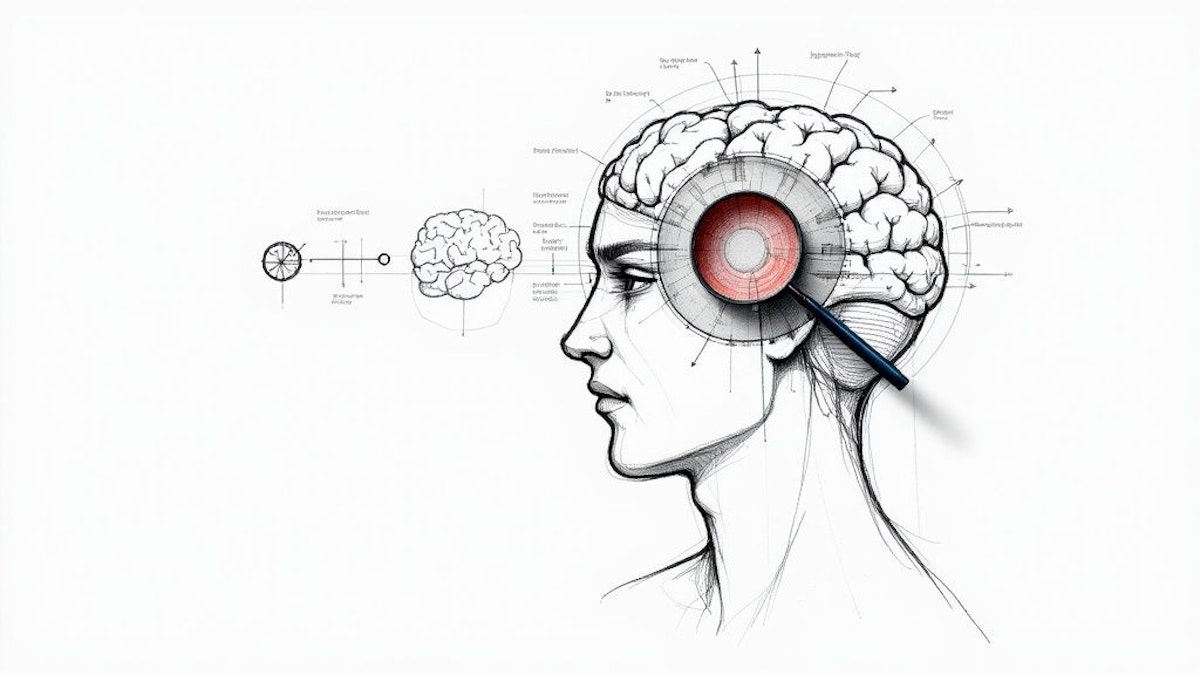
So, what exactly are psychometric assessments? Think of them as a blueprint for a candidate's mind. They're scientifically designed tools that go beyond a resume to measure cognitive abilities and personality traits, giving you a data-driven look into how someone thinks, behaves, and solves problems.
Unlocking a Deeper View of Talent
Imagine trying to figure out a complex machine just by looking at its shell. You see the basic parts, but you have no clue how they'll work together under pressure. A resume and a traditional interview are a lot like that—they show you a candidate's experience and how they present themselves, but they miss the underlying drivers of performance.
Psychometric assessments are like an MRI for your talent pool. They provide a much deeper, more objective look inside. Instead of just guessing how a candidate might handle stress, work with a team, or approach a tricky problem, these tools give you standardized data on their natural tendencies and capabilities.
It’s not about finding a "pass" or "fail." The real goal is to find the right alignment between a person, the role, and your company’s unique culture.
The Science Behind the Insights
At their core, psychometric assessments are standardized evaluations built to measure psychological attributes—things like cognitive skills, personality, and knowledge. This scientific approach means every candidate is measured against the same benchmark, which helps strip away the unconscious bias that so often slips into hiring decisions.
The demand for these objective tools is exploding. According to a report by Future Market Insights, the global market was valued at USD 1,082.5 million in 2023 and is expected to grow at a compound annual growth rate (CAGR) of about 11.9% through 2033. You can dig into more data on the psychometric test market to see just how fast companies are adopting these methods.
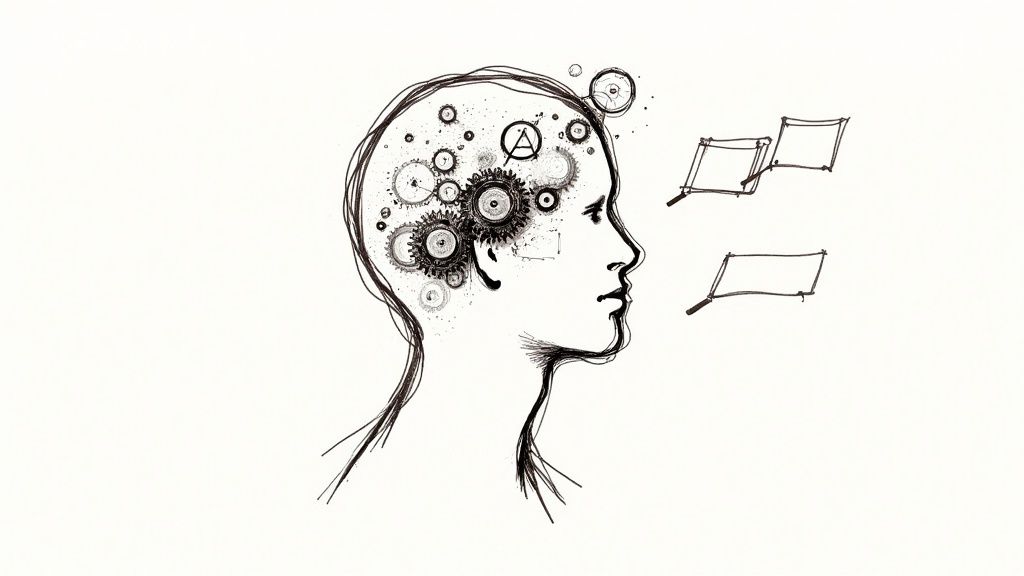
What Do These Assessments Actually Measure?
While there are many different kinds of tests, they generally focus on two key areas:
- Cognitive Abilities: These assessments measure aptitude for tasks like numerical reasoning, verbal comprehension, and logical thinking. They help answer the fundamental question: "Can this person do the job?"
- Personality and Behavioral Traits: These questionnaires map out an individual's work style, what motivates them, and how they interact with others. They get to the heart of a different question: "How will this person do the job and fit within our team?"
To make these concepts clearer, here’s a quick breakdown of what these assessments look at and why it matters in a hiring context.
Key Aspects of Psychometric Assessments at a Glance
| Aspect | Description | Primary Goal in Hiring |
|---|---|---|
| Standardization | Every candidate takes the same test under the same conditions. | To ensure fairness and remove bias from the evaluation process. |
| Objectivity | Results are based on data and algorithms, not subjective opinions. | To make hiring decisions based on evidence rather than gut feelings. |
| Reliability | The assessment consistently produces similar results over time. | To trust that the test provides a stable measure of a candidate's traits. |
| Validity | The test accurately measures what it claims to measure (e.g., job performance). | To predict a candidate's future success and on-the-job effectiveness. |
This table shows how each component works together to create a powerful, predictive tool for talent acquisition.
By combining these insights, you can build a far more complete picture of a candidate's potential for long-term success. It’s a shift away from gut feelings and toward decisions backed by solid evidence. This guide will walk you through everything you need to know to make that shift happen.
What Are the Core Types of Psychometric Assessments?
When you start looking into psychometric assessments, you quickly realize they’re not a one-size-fits-all tool. Think of them more like a specialist's toolkit, with different instruments designed to measure very specific aspects of a candidate's profile. Getting a handle on these categories is the first step to really making them work for you.
Broadly speaking, these assessments fall into a few key camps, each designed to answer a different—but equally critical—question about a potential hire. This visual gives a great high-level overview of the main types you'll come across.
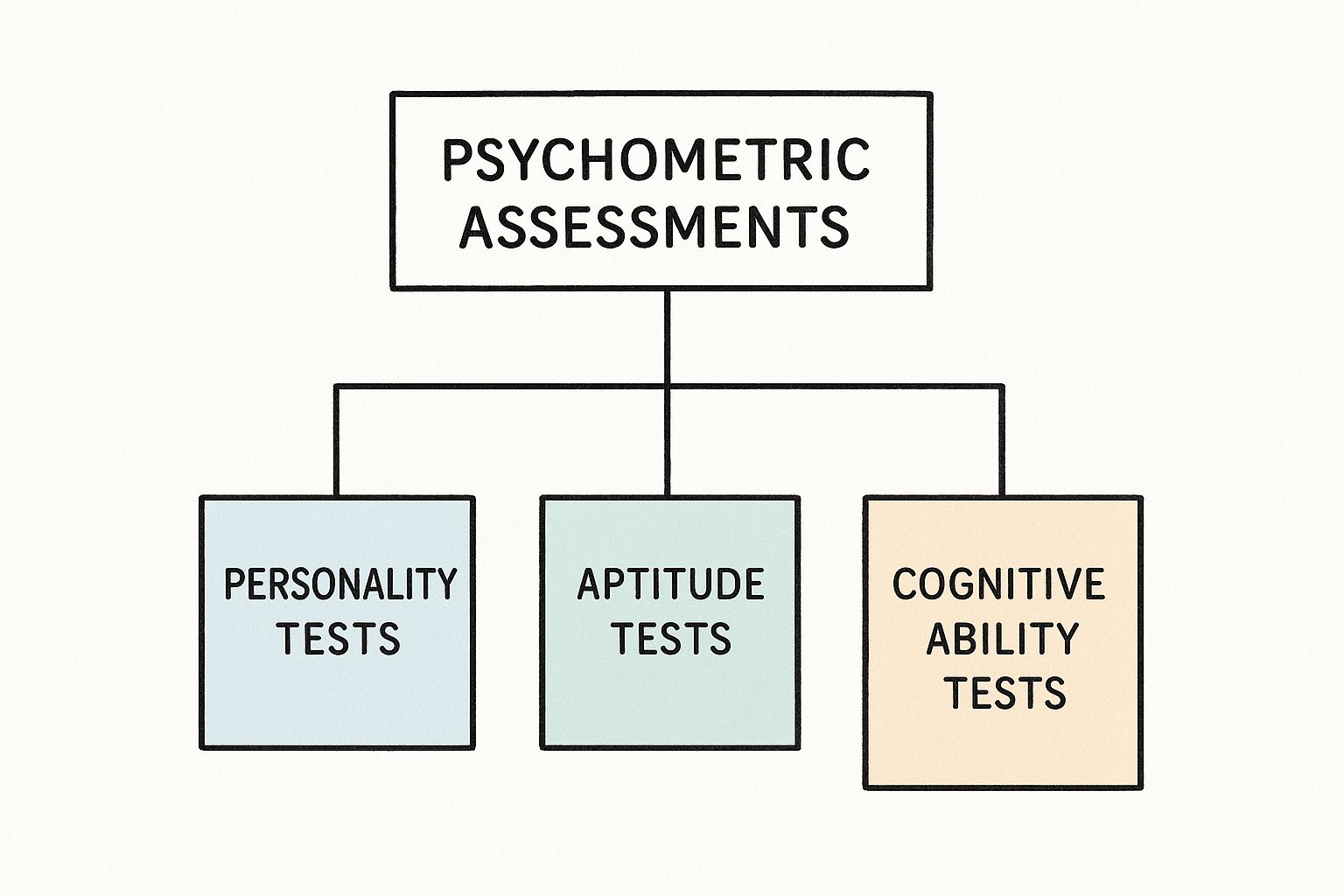
As you can see, the major players are personality, aptitude, and cognitive ability tests. Used together, they paint a remarkably complete picture of who a candidate is and what they could bring to your team. Let's dig into what each one tells you.
Aptitude and Cognitive Ability Tests: Answering "Can They Do the Job?"
Aptitude and cognitive ability tests are all about measuring a person's raw intellectual horsepower and their potential to pick up new skills. It helps to think of these as an evaluation of a candidate’s "hardware"—their processing speed, reasoning skills, and how they handle new information. They get straight to the point, focusing on the “can do” part of the hiring equation.
It's a common mistake to think these tests measure what someone learned from a textbook. They don't. Instead, they assess how well candidates can apply their reasoning skills to solve problems they’ve never encountered before.
Some of the most common types you'll see are:
- Verbal Reasoning: This is much more than a vocabulary quiz. It measures a candidate's ability to understand, analyze, and draw logical conclusions from written information. This skill is non-negotiable for anyone who needs to interpret dense reports, complex emails, or contracts.
- Numerical Reasoning: This looks at how well someone can work with data presented in charts, graphs, and tables. It’s a fantastic indicator of future performance in roles across finance, marketing, and operations where data-driven decisions are made daily.
- Abstract or Logical Reasoning: Often using shapes and patterns, this type assesses a candidate's knack for spotting logical rules and solving conceptual problems. It’s a powerful predictor of strategic thinking and the ability to get your head around complex systems.
These assessments have proven to be highly predictive of job performance, simply because they measure the core abilities needed to learn and adapt. Landmark research by Frank L. Schmidt and John E. Hunter, analyzing 85 years of studies, found that general cognitive ability is the single most powerful predictor of job performance across a wide range of roles.
Personality Questionnaires: Revealing "How They Will Do the Job"
If aptitude tests show what a candidate can do, personality questionnaires reveal what they will likely do. These tools get to the heart of an individual's ingrained behaviors, their motivations, and how they prefer to work. This is the "software" that dictates how they’ll interact with colleagues, approach their tasks, and handle pressure.
Crucially, there are no right or wrong answers here. The entire goal is to understand a candidate's natural leanings and see how they mesh with the unique demands of the role and your company culture.
People often call these "tests," but that's a bit of a misnomer. They're actually structured questionnaires designed to map out a person's behavioral preferences. This map helps you predict their on-the-job actions and how well they’ll fit in.
One of the most scientifically solid frameworks used in these assessments is the Big Five model. It breaks personality down into five broad dimensions:
- Openness: How curious and open is this person to new experiences and unconventional ideas?
- Conscientiousness: How organized, dependable, and goal-focused are they?
- Extraversion: Do they draw their energy from social interaction or from quiet solitude?
- Agreeableness: How cooperative and compassionate are they when working with others?
- Neuroticism (or Emotional Stability): How well do they handle stress and bounce back from setbacks?
Knowing where a candidate lands on these scales allows you to make much more informed predictions. For example, a candidate high in conscientiousness is a safe bet to be a reliable and diligent employee. Someone high in extraversion might be a natural fit for a client-facing sales role.
To see these theories in action, it's helpful to look at real-world examples of psychometric tests that hiring managers rely on every day. This kind of insight provides a clear roadmap for matching the right person to the right work environment—which is exactly how you build strong, effective teams.
Aptitude Tests vs Personality Questionnaires
So, how do you decide which type of assessment to use? It really comes down to what you need to measure. Aptitude tests are about capability, while personality questionnaires are about compatibility. This table breaks down the core differences to help you choose the right tool for the job.
| Feature | Aptitude and Ability Tests | Personality and Behavioral Questionnaires |
|---|---|---|
| Purpose | Measures maximum performance and cognitive potential. | Measures typical behavior, preferences, and work style. |
| Question Type | Objective questions with correct/incorrect answers. | Subjective questions with no right or wrong answers. |
| What It Predicts | A candidate's ability to learn, problem-solve, and succeed in a role. | How a candidate is likely to behave, fit into the team, and align with company culture. |
| Format | Timed assessments focused on speed and accuracy. | Untimed, self-report questionnaires based on personal reflection. |
| Best Used For | Roles requiring strong analytical, reasoning, or problem-solving skills. | Assessing culture fit, leadership potential, and team dynamics. |
Ultimately, the most powerful approach often involves using both. An aptitude test can confirm a candidate has the intellectual chops for the role, while a personality questionnaire can give you confidence they'll thrive in your specific team and company environment. This dual-layered insight is what truly elevates a hiring process from good to great.
Why Top Companies Rely on Psychometric Data
So, we've covered what these assessments are, but the real question is why top companies are investing so heavily in them. It’s pretty simple: they deliver a powerful, measurable return. In a tight talent market, just going with your gut is a gamble you can't afford to take. Data-driven insights from these tools offer a much more reliable way to build a team that clicks.
And the market reflects this shift. A report by Allied Market Research valued the global psychometric tests market at USD 3.2 billion in 2023 and projected it to reach USD 5.8 billion by 2033. This growth isn’t random; it’s being driven by companies that are getting serious about using data for smarter hiring and employee development.
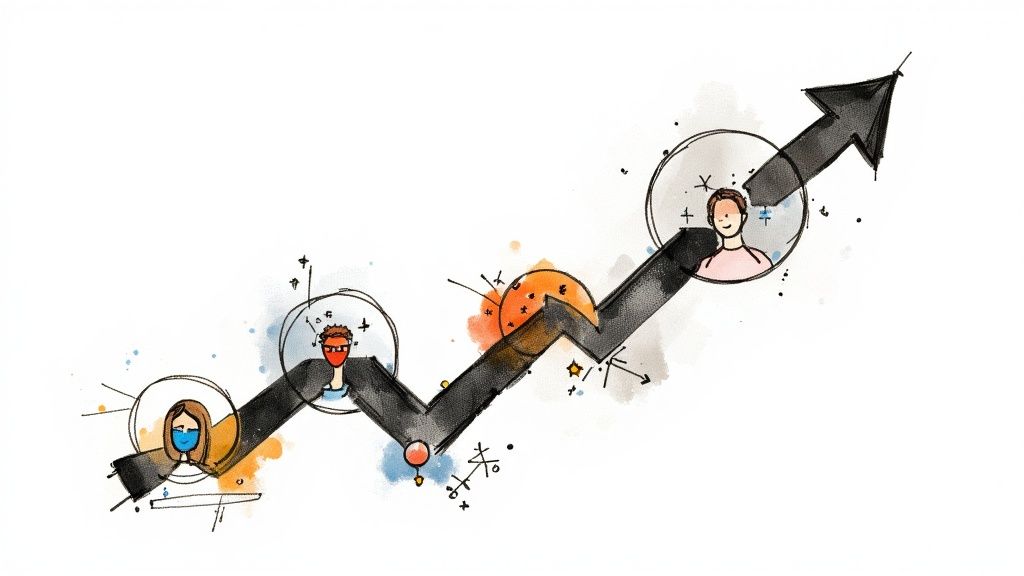
This move toward evidence-based hiring is about more than just numbers—it’s about making smarter, more strategic decisions about the people who will define your company's future. Let's dig into the specific advantages that are convincing leaders to make the switch.
Creating a More Objective Hiring Process
Let's be honest: unconscious bias is a massive roadblock in hiring. Even the most well-meaning interviewers can be influenced by things that have zero to do with a candidate's ability to do the job—like sharing an alma mater, having a magnetic personality, or just getting a "good vibe."
This is where psychometric data comes in as a powerful reality check. By providing the same standardized metrics for every single candidate, these assessments shift the focus back to what truly matters: job-relevant skills and traits.
An assessment doesn't care what a candidate looks like, where they went to school, or how charming they are. It only measures their cognitive abilities and behavioral tendencies, creating a level playing field for everyone.
This objectivity helps strip away personal biases from the evaluation process, leading to fairer decisions and more diverse teams. It’s about hiring based on real potential, not just a polished resume or a great interview.
Improving Employee Retention and Reducing Costs
Hiring is expensive. But you know what’s even more expensive? A bad hire. When someone walks out the door within the first year, the costs of recruiting, onboarding, and lost productivity are staggering. Research from the Society for Human Resource Management (SHRM) suggests the cost can be as high as 50% to 200% of an employee's annual salary. More often than not, this early turnover happens because of a fundamental mismatch between the person, the role, and the company culture.
Psychometric assessments help you get ahead of this problem. By evaluating for things like culture fit and behavioral alignment before you extend an offer, you dramatically increase the odds of making a hire that sticks.
Here's how this data-driven approach helps boost retention:
- It confirms role alignment. You can see if a candidate has the natural cognitive wiring and work style to handle the day-to-day demands of the job without burning out.
- It predicts culture fit. The data reveals whether a candidate's values and communication style will actually vibe with your existing team.
- It sets clear expectations. These insights help you create better onboarding plans and manage new hires more effectively from day one, setting them up for success.
When new hires are a better match from the start, they’re more engaged, more productive, and far more likely to stay for the long haul. That translates directly to lower turnover costs and a much more stable, cohesive team.
Predicting Future Job Performance
Perhaps the most compelling reason to use psychometric tools is their proven track record in predicting future success. Decades of organizational psychology research have established a clear link between how someone scores on certain assessments and how well they actually perform on the job.
Cognitive ability tests, for example, are one of the single best predictors of performance across almost any role you can think of. A meta-analysis published in the Journal of Applied Psychology confirmed that cognitive ability is a strong predictor of job performance. If a candidate scores highly on a logical reasoning test, it’s a strong indicator they’ll be great at solving complex problems once they're on your team. Similarly, a personality assessment can pinpoint candidates high in conscientiousness—a trait consistently linked to being reliable, diligent, and organized.
To see the big picture, it helps to think about how these assessments fit into a robust talent management strategy. The predictive data they provide doesn't just improve hiring; it also informs employee development, succession planning, and team building, creating a cycle of continuous improvement across the entire organization.
A Practical Guide to Implementing Psychometric Assessments
Bringing psychometric assessments into your hiring process can feel like a big project, but it doesn't have to be. With the right game plan, you can smoothly integrate these tools and start making smarter, data-driven hiring decisions.
Here’s a straightforward roadmap to get you from theory to real-world impact. The first step? It’s not about the tests at all.
Define What Success Looks Like
Before you even glance at an assessment, you need a crystal-clear picture of what it takes to succeed in the role you're hiring for. A generic job description just won’t cut it. You have to dig deeper to identify the core competencies—the make-or-break skills, behaviors, and personality traits.
Is this a job that demands laser-like focus and meticulous attention to detail? Or is it a client-facing role where resilience and a knack for building rapport are the real keys to success? Answering these questions gives you a benchmark to measure every single candidate against.
Think of it like creating a detailed blueprint for your ideal hire. Without that blueprint, you're just grabbing random materials and hoping they somehow form a sturdy building. A clear competency model makes sure every choice is deliberate.
Once you know exactly what you’re looking for, it’s time to find the right tool for the job.
Select the Right Validated Assessment
With your ideal candidate profile in hand, you can now find an assessment that actually measures the traits you care about. The key word here is validated. This means the test has been scientifically proven to reliably measure what it claims to. Steer clear of those unverified online quizzes—they're the junk food of the assessment world.
A reputable provider will always be transparent about their test's validity and reliability. Your goal is to find a tool that lines up perfectly with your needs.
- For highly analytical roles: A cognitive ability test that measures numerical or logical reasoning is a great fit.
- For leadership positions: You’ll want a personality questionnaire that can shed light on traits like conscientiousness, extraversion, and emotional stability.
- For tight-knit, collaborative teams: Behavioral assessments are perfect for revealing a candidate’s natural work style and how they communicate.
Choosing the right assessment is a pivotal step. For a deeper look at your options, our guide on pre-employment assessment tools breaks down the best tools out there to help you find a perfect match.
Strategically Place the Assessment in Your Funnel
When you introduce the assessment in your hiring process matters—a lot. Your timing can completely change its impact. There are generally two schools of thought here.
Top-of-Funnel Screening: Using assessments right at the start is a lifesaver for high-volume roles. It lets you objectively screen a huge applicant pool and filter for candidates who meet your baseline requirements before anyone on your team spends a minute reviewing a resume. The time savings can be massive.
Mid-Funnel Validation: The other approach is to use the assessment after an initial screen or first interview. This works well for more senior or specialized roles. Here, the goal is to validate the impressions you got from the interview or to uncover specific areas you need to probe further in the next conversation.
There's no magic answer. The best strategy depends entirely on the role, how many applicants you expect, and what you’re trying to achieve.
Interpret the Results as Part of a Whole Picture
This is the most important part: assessment results are just one piece of the puzzle. They should never, ever be the only reason you hire or reject someone. The real power of this data comes from using it to enrich the entire picture of a candidate, not to replace your judgment.
Think of it as adding another layer of insight to your candidate evaluation. A complete profile is built from multiple sources:
- The resume tells you about their experience.
- The interview reveals their communication skills and vibe.
- A work sample shows their practical, hands-on abilities.
- The assessment uncovers their underlying cognitive and behavioral tendencies.
When you review the results, look for the story the data tells when combined with everything else you know. If an assessment flags low conscientiousness, but a candidate's references rave about their reliability, that’s not a red flag—it’s a signal to ask more questions. That’s how you move from just collecting data to making truly intelligent hiring decisions.
Navigating the Challenges and Ensuring Ethical Use
Psychometric assessments are powerful, but with great power comes great responsibility. Using them effectively isn't just about gathering data; it's about using that data ethically and responsibly. Getting this right is absolutely critical, because mishandling these tools can easily create barriers, erode trust, and damage your employer brand.
So, how do you make sure you’re on the right side of the line? It all comes down to building your process on a solid foundation of fairness, transparency, and a real commitment to a positive candidate experience.
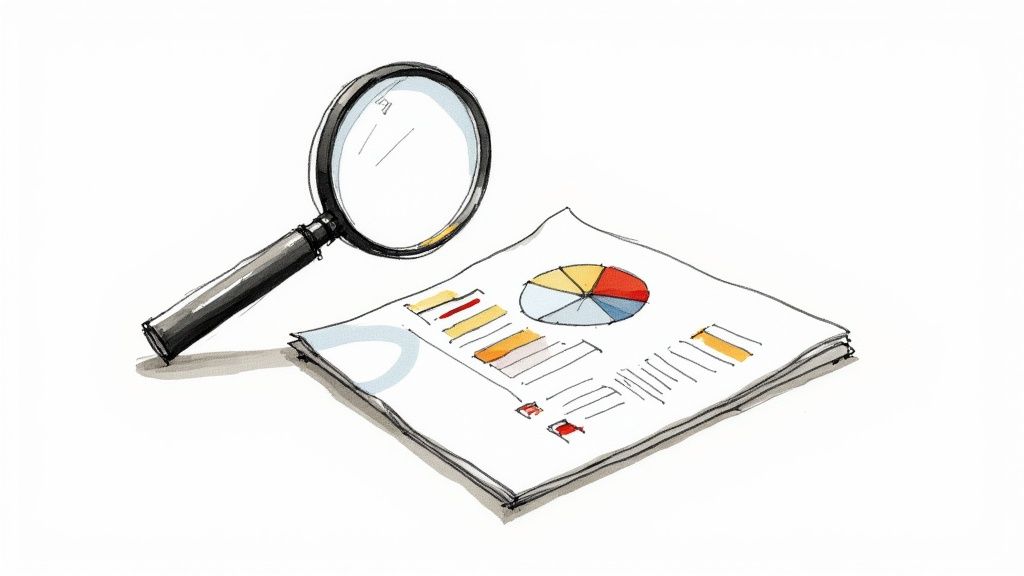
Upholding Fairness and Mitigating Bias
Let’s be honest: the biggest fear with any hiring tool is bias. The good news is that well-designed psychometric assessments are one of the best defenses against it. The key is to only use tools that are scientifically validated and have been meticulously engineered to be objective and non-discriminatory.
Reputable assessments go through intense testing to ensure they don't give an unfair advantage or disadvantage to any group based on gender, age, ethnicity, or background. This scientific foundation is what separates a professional tool from a pop-psychology quiz online. It measures every single candidate against the same standardized, controlled benchmark.
A study by the Aberdeen Group found that companies using pre-hire assessments reported a 39% lower turnover rate and were 24% more likely to have a high-performing workforce. This isn't just a trend; it's a testament to their value when used correctly to ensure fairness.
Understanding Reliability and Validity
To use these tools ethically, you need to get comfortable with two core concepts: reliability and validity. They sound a bit academic, but the idea is actually simple.
- Reliability is all about consistency. Think of it like a bathroom scale. If you step on it three times and get three wildly different numbers, it’s not reliable. A reliable assessment gives you consistent results over time.
- Validity is about accuracy. Does the test actually measure what it claims to measure? More importantly for hiring, do the results actually predict success on the job? That same scale might be reliable (giving you the same wrong number every time), but it's not valid until it's properly calibrated.
A test can be reliable without being valid, but it can never be valid if it isn't reliable first. Grasping the crucial difference between validity and assessment is non-negotiable for making fair and smart hiring decisions. Don't be afraid to ask any vendor for hard proof of both.
Creating a Positive Candidate Experience
The way you use an assessment sends a powerful message to candidates about your company culture. A clunky, confusing, or secretive process can leave a terrible impression, making people feel stressed or judged. On the flip side, a thoughtful approach shows you respect their time and effort.
Here are a few simple ways to make the experience a great one:
Be Transparent: No one likes a black box. Explain what the assessment is for and how the results fit into the bigger picture. Make it clear that it's just one piece of the puzzle, not the only thing that matters.
Provide Clear Instructions: Set candidates up for success. Give them all the details—is it timed? What kind of device should they use? Who can they contact if they run into a technical snag?
Offer Constructive Feedback: This is a game-changer. Whenever you can, offer to share some of the insights from the assessment with the candidate. It provides real value to them, no matter the outcome, and frames your company as one that invests in people.
By weaving fairness, scientific rigor, and a human-centric approach into your process, you can tap into the incredible potential of psychometrics while holding yourself to the highest ethical standards.
The Future of Talent Assessment
The world of hiring doesn't stand still, and the tools we rely on to find great people are changing right along with it. We're moving past the old-school bubble tests and into a future where talent assessment is more dynamic, engaging, and genuinely insightful.
One of the biggest shifts? The move toward gamified assessments. Instead of clicking through a dry, multiple-choice questionnaire, candidates engage with interactive challenges. This isn't just about making things fun; it lowers test anxiety, keeps candidates invested, and gives you a far more authentic look at how they solve problems on the fly.
The Rise of AI and Adaptive Testing
At the same time, artificial intelligence is completely changing the engine under the hood. AI and machine learning now power adaptive tests, which are smart enough to adjust the difficulty of questions based on how a candidate is doing.
Get a question right, and the next one gets a little tougher. Stumble on one, and the system dials it back. This creates a tailored experience that avoids frustrating or boring the candidate, all while zeroing in on their true ability level with incredible precision. To see just how much this is changing the game, you can learn more about how AI hiring is transforming recruitment with smarter tools.
A New Focus on Essential Soft Skills
What we measure is changing, too. While raw intelligence and technical skills will always matter, today's complex and collaborative workplaces run on soft skills. Assessments are increasingly being designed to pinpoint the human traits that truly make or break success.
We're talking about competencies like:
- Adaptability: How well does someone roll with the punches when priorities shift?
- Resilience: Can they recover from a setback and stay focused under pressure?
- Emotional Intelligence: Are they self-aware and skilled at reading the room?
These are the exact qualities that are so hard to pin down in a typical interview, yet they are some of the strongest predictors of who will thrive in your company long-term. The next wave of assessments gives us real data on these crucial skills.
This shift isn't just a niche trend; it's a global movement. While North America currently holds the largest piece of the psychometric assessment market—valued at around USD 4.96 billion in 2023 according to Dataintelo—the fastest growth is happening in the Asia Pacific region, fueled by incredibly competitive job markets. You can discover more insights about these market dynamics on Dataintelo. This worldwide adoption makes one thing clear: building the teams of tomorrow requires the assessment tools of the future.
Got Questions? Let's Talk Psychometric Assessments
Even when you know the basics, a few specific questions always seem to pop up. Let's tackle some of the most common ones head-on to clear up any confusion about using these tools in your hiring process.
Can Candidates Fake Their Way Through a Psychometric Test?
It's a fair question, and one we hear a lot. The short answer is: it's a lot harder than you might think. Good, professionally designed assessments have built-in safeguards to maintain their integrity.
For example, many personality questionnaires include internal consistency checks. These can easily flag when someone is answering questions in a contradictory way, which often happens when they're trying to project an "ideal" version of themselves rather than being genuine.
When it comes to ability tests, the combination of tight time limits and a huge pool of randomized questions makes cheating nearly impossible. The best defense, though, is being upfront. Tell candidates the goal isn't to get a "perfect score" but to find a role where they'll truly thrive. That encourages honesty right from the start.
Remember, these tools are about finding the right fit, not just passing a test. When candidates get that, they’re far more likely to give you the real insights you need to make a great hiring decision.
Do These Tests Actually Predict How Someone Will Perform on the Job?
Absolutely. When used the right way, psychometric assessments are one of the most reliable predictors of job performance out there. Decades of organizational psychology research back this up, showing a strong, consistent link between assessment results and on-the-job success.
Cognitive ability tests, in particular, have a rock-solid correlation with high performance across almost every role and industry you can imagine. You'll get the most predictive power out of them when you use the data as one piece of a larger puzzle, combining it with what you learn from structured interviews, work samples, and reference checks.
How Do I Pick the Right Assessment for My Company?
The first step has nothing to do with looking at tests. It starts with a deep dive into the role itself. Before you even think about vendors, you need to map out the essential skills, behaviors, and personality traits someone needs to excel in that specific job. Think of this "job analysis" as your blueprint.
Once you have that blueprint, you can start looking for providers who offer scientifically validated tests designed to measure those exact things. Ask for the data that supports a test's reliability (does it measure consistently?) and its validity (does it accurately measure what it claims to?). Finding a reputable partner is crucial to choosing a tool that’s both effective and fair.
What’s the Difference Between "Psychometric" and "Personality" Tests?
This one trips a lot of people up, but it's pretty simple. Think of "psychometric assessment" as the main category, like "vehicles." Under that umbrella, a "personality test" is just one specific type, like a "sedan."
A psychometric assessment is the overarching term for any standardized, scientific tool used to measure a person's mental capabilities and behavioral style. This broad category includes several different types:
- Personality Tests: These look at a person's traits, motivations, and preferred working styles.
- Cognitive Ability Tests: These measure things like reasoning, problem-solving, and the ability to learn new things.
- Skills Tests: These evaluate practical abilities, like coding, writing, or using specific software.
- Emotional Intelligence Tests: These gauge self-awareness, empathy, and social skills.
So, a personality test is simply one valuable tool within the much larger psychometric toolkit.
Ready to build a stronger, more aligned team with data-driven insights? MyCulture.ai offers a suite of customizable, science-backed assessments to help you identify candidates who truly fit your organization's unique culture and values. Discover how you can make smarter hiring decisions.